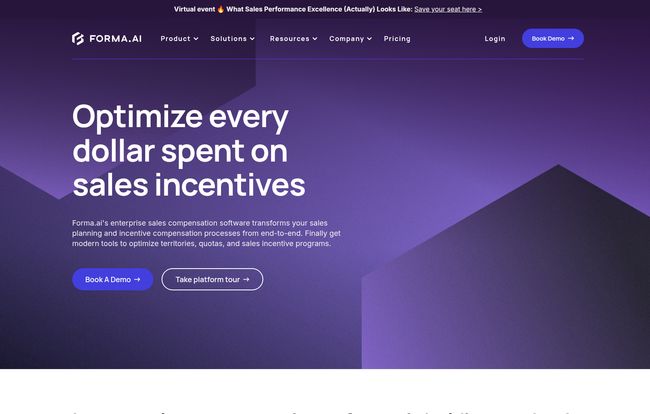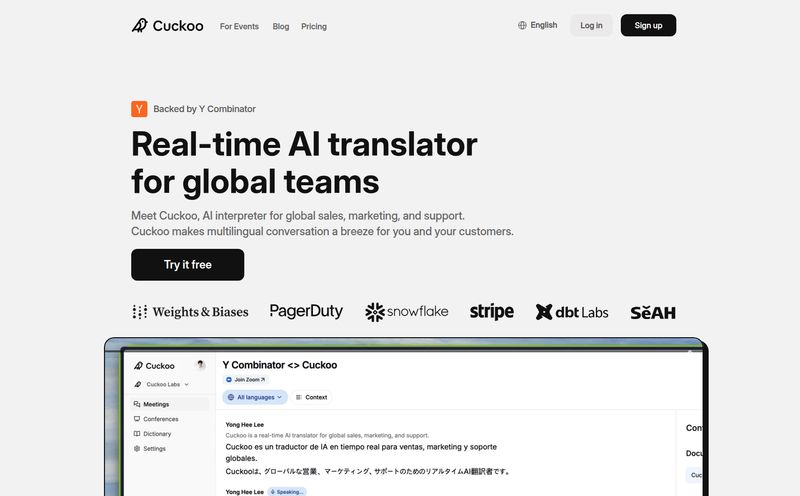Sales compensation can be an absolute nightmare. For years, I’ve seen companies—from scrappy startups to massive enterprises—run their most critical revenue engine on a prayer and a spreadsheet. You know the one. It’s got a million tabs, colors that hurt the eyes, and VLOOKUPs so complex they could probably achieve sentience. Every end-of-quarter is a frantic scramble of manual calculations, disputes from reps, and a nagging fear that a single misplaced decimal could cost the company thousands.
It’s a mess. A necessary mess, we told ourselves. But is it, really?
I’ve been keeping my eye on a new wave of platforms promising to fix this. They call it “CompOps,” or Compensation Operations. The idea is to treat compensation with the same rigor and automation as we treat software development (DevOps) or marketing (Marketing Ops). And one of the names that keeps popping up is Forma.ai. They claim their AI-powered platform can displace this legacy way of doing things. Big claims. So, I decided to take a closer look.
First Off, What is Forma.ai?
Forma.ai isn't just another incentive compensation management (ICM) tool that puts a prettier face on the same old process. It positions itself as a complete, end-to-end sales performance management platform. The core difference? Artificial intelligence. Instead of just calculating commissions based on rules you set, Forma.ai uses AI to help you design, model, and automate the entire compensation lifecycle.
Think of it as moving from being a spreadsheet janitor to a sales compensation architect. Instead of just cleaning up messes, you’re proactively designing incentive structures that actually drive the behaviors you want to see. It’s about creating a single source of truth for all sales performance data, connecting everyone from Sales Ops and Finance to the sales reps themselves.

Visit Forma.ai
The whole concept is built on this idea of CompOps. It’s a term that might be new to some, but it makes perfect sense. It’s about applying operational excellence to the art and science of paying people. No more disconnected systems. No more strategy getting lost in the execution. At least, that's the promise.
The Pain of Keeping Things Old-School
Why is a tool like this even necessary? Because the old way is genuinely broken. I was once part of a RevOps team where our sales comp plan was so convoluted that we had a two-hour meeting every month just to explain it to new hires. And they still had questions. The reps didn't trust the numbers, which led to shadow accounting (everyone keeping their own spreadsheet), which only created more disputes.
The biggest problem is agility. What happens when a market shifts, or a new competitor emerges? You need to adjust your sales strategy, and that means adjusting your incentives. With a manual system, changing a comp plan mid-year is like trying to change the engine on a moving car. It’s slow, risky, and someone’s probably going to get burned. Forma.ai seems to be tackling this head-on by allowing for real-time modeling. You can see the potential impact of a change before you roll it out. That's a huge deal.
How Forma.ai Is Shaking Things Up
So how does this AI actually work in practice? From what I've gathered, it’s not some magic button. It's a system that breaks the process down into a few key areas.
AI-Driven Plan Design and Modeling
This is the really interesting part for me. Instead of guessing what will motivate your team, Forma.ai allows you to model different scenarios. What if we add a kicker for multi-year deals? How would a different commission rate for a new product line affect overall payout and revenue? The platform can simulate these outcomes, helping you build plans based on data, not just gut feelings. It’s about fine-tuning every lever you can pull to optimize performance without overspending.
Automating the Entire Grind
Once the plan is set, the automation kicks in. The platform integrates with your existing systems, like your CRM and HRIS, to pull in the necessary data. It handles all the crediting rules, calculations, and adjustments automatically. This eliminates the human error that plagues manual processes and frees up your Sales Ops and Finance teams from the drudgery of spreadsheet management. One of their customer testimonials really says it all:
“Forma.ai has significantly cut down the time my team’s commissions analysts spend on payment and service letter communications.”
That quote speaks volumes. It’s not just about accuracy; it's about giving your highly skilled people their time back to focus on more strategic work.
Analytics That Don’t Require a PhD
Finally, it provides real-time visibility through dashboards and reports. Sales leaders can see how the team is tracking against quotas, finance can forecast commission costs accurately, and reps can see exactly how they’re getting paid and what they need to do to earn more. This transparency is probably one of the biggest drivers of trust. When reps understand their comp plan, they’re more motivated to perform.
So, What's the Catch? Let's Talk Pricing
Alright, here’s the part everyone always scrolls down to find. What does Forma.ai cost? Well, if you’re looking for a neat little pricing table with Bronze, Silver, and Gold tiers, you’re out of luck.
Forma.ai uses a custom quote model. You have to fill out a form and talk to their sales team. On one hand, this is pretty standard for enterprise-grade software. Your needs are unique, your data is complex, and the solution needs to be configured for you. They describe their pricing as having three main parts:
- A one-time Onboarding & Implementation fee. They call it a “white glove” service, which suggests they do most of the heavy lifting for data migration and setup.
- A fee for the CompOps Platform itself, which likely varies based on the features, reports, and dashboards you need.
- A component for the AI-Configurator, which is their core AI engine. This seems to be a collaborative setup where their experts help you configure the AI logic.
On the other hand, the lack of transparent pricing can be frustrating. You can’t quickly figure out if it's even in your ballpark without getting on a sales call. My take? This platform isn’t for the small business just starting out. It’s aimed at mid-market and enterprise companies with complex sales teams and a real budget to solve a major operational headache.
Is Forma.ai the Right Move for You?
Like any platform, it's not a silver bullet. There are definite upsides and a few things to keep in mind.
The good stuff is pretty clear. The AI-driven automation can save immense amounts of time and reduce costly errors. Having a single source of truth for performance data is invaluable, and the ability to model plans before launch is a strategic advantage. It integrates with major systems like Salesforce and Workday, and it’s built to scale with large, complex teams.
However, you have to go in with your eyes open. Implementation isn’t just a switch you flip; it involves data migration and setup. There will be a learning curve, especially for teams not familiar with the CompOps philosophy. And perhaps most importantly, you have to place a certain amount of trust in the platform's AI. For some old-school finance leaders, letting an algorithm handle compensation can feel like a leap of faith, even if the old spreadsheet was barely holding on.
Frequently Asked Questions about Forma.ai
- What exactly is CompOps?
- Think of it like DevOps, but for sales compensation. It's a business philosophy that uses technology and data to align sales compensation strategy with execution, creating a more agile, automated, and transparent process.
- Does Forma.ai replace my CRM like Salesforce?
- No, not at all. It integrates with your CRM. Your CRM is for managing customer relationships and sales activities. Forma.ai pulls data from your CRM (like closed deals) to calculate commissions and manage incentive plans.
- Who is the ideal user for this platform?
- The platform is designed for larger organizations. The key users would be in Revenue Operations (RevOps), Sales Operations, Finance, and HR departments who are responsible for designing, managing, and executing sales compensation.
- Can it handle really complex commission structures?
- Yes, that seems to be its specialty. The platform is built to handle scalability, meaning it can manage complex rules, multi-layered hierarchies, territory splits, and various types of incentives that would break a typical spreadsheet.
- How long does the implementation process take?
- While they don't give a specific timeline, their mention of a “white glove” onboarding and implementation process suggests it's a structured project, not an instant setup. You should probably plan for a few weeks to a couple of months, depending on the complexity of your data and plans.
- Is there a free trial for Forma.ai?
- Based on their website, they don't offer a public free trial. The path forward is to request a custom demo and a personalized quote from their sales team.
The Final Verdict
So, is Forma.ai the future of sales compensation? For a lot of companies, I think the answer is yes. The shift away from manual, error-prone processes toward intelligent, automated systems feels inevitable. We did it with marketing, we did it with finance, and sales compensation is the next logical frontier.
Forma.ai isn't a simple, cheap plugin. It's a strategic investment for companies who recognize that their sales compensation plan is one of the most powerful tools they have for driving revenue. If you're tired of fighting with spreadsheets and want to turn your comp plan into a competitive advantage, it's definitely worth starting a conversation with them. The days of the god-tier spreadsheet are numbered, and frankly, I’m not sad to see them go.



